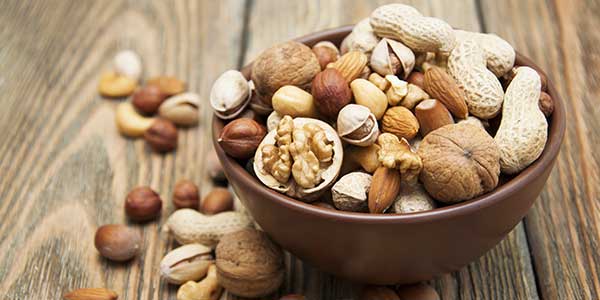What Are Nuts?
Technically a fruit, a nut is composed of an inedible hard shall and generally edible seed. There are numerous kinds of nuts to choose from, including almonds, cashews, pecans, walnuts, pistachios, macadamia nuts, hazelnuts, and brazil nuts. Though peanuts are often categorized in the nut family, they are actually considered a legume. Raw nuts are considered a plant-based protein source, making them eligible for comprising a vegetarian and vegan diet. Nut varieties serve as a convenient snack, add crunch to salads, become thrown into smoothies, and are even produced into dairy-free milks. Also worth mentioning, tree nuts are one of the most common allergens in children and adults. If you suspect a nut allergy, it is imperative to avoid all nuts and products, along with scheduling an appointment with an allergist for diagnostic and management purposes.
Health Benefits of Nuts
Although there are numerous nut varieties to choose from, the nutritional profile of each are relative. A one ounce serving of peanuts (approximately 1/8 cup or small handful) contains approximately 170 calories, 6 grams of carb, 5 grams of protein, and 14 grams of fat. But do not let the ample fat content scare you, as nuts contain unsaturated fats that have shown to be highly beneficial. Varieties also contain omega-3 fatty acids, a type of polyunsaturated fat (PUFA) mostly recognized in fatty fish. While nutrient quantity is also variable, most nuts are rich in fiber, plant sterols, vitamin E, magnesium, selenium, phosphorus, manganese, and copper. The mostly small, but always mighty nuts ultimately prosper the following health benefits:
Fosters Weight Loss
Despite their caloric density, eating nuts may actually assist in weight loss. In fact, a study published in The Journal of Nutrition suggests the inclusion of nuts improves satiety, diet compliance, and weight loss, further suggesting they enhance the palatability and nutrient quality without threatening the risk of weight gain.
Protects the Heart
One of the most recognized benefits of eating nuts relates to numerous heart-protective components, including their healthy fat content. Unsaturated fats and omega-3 fatty acids may normalize blood lipid levels, while some evidence has shown nut consumption may lower blood pressure. Nonetheless, numerous studies have shown a significant decreased cardiovascular disease and mortality risk with increased nut consumption.
Prevents and Manages Diabetes
A study published in Asia Pacific Journal of Clinical Nutrition explains not only does eating nuts alone minimize the effects of postprandial blood glucose levels, but even blunt the response of a carbohydrate meal. A meta-analysis featured in The American Journal of Clinical Nutrition reported an inverse association between eating nuts and the incidence of diabetes, meaning as nut consumption increases, the incidence of diabetes decreases.
Reduces Inflammation
Nuts are chock full with antioxidants, defenders and inhibitors of oxidation, a chemical process and reaction that has the potential to produce free radicals. Antioxidants aim to lower inflammation, subsequently lessening the risk of numerous chronic disease states and reducing symptoms in inflammatory disorders such as rheumatoid arthritis.
Supports Brain Health
While evidence regarding nut consumption and neurological or psychiatric disorders is scarce, a number of studies suggest significant protective effects against depression, mild cognitive disorders and Alzheimer’s disease. Research also implies omega-3s may reduce the risk of and manage bipolar disorder and depression, with PUFAs showing to protect the central nervous system (CNS).
Cuts Cancer Risk
The consumption of nuts may reduce the risk of a colorectal, endometrial, and pancreatic cancers. Furthermore, a News Release from American Society of Clinical Oncology (ASCO) reported the chance of colon cancer recurrence nearly cut in half in people who eat nuts.
Promotes Longevity
Both omega-3s and vitamin E have also been attributed to skin health, particularly by keeping the skin hydrated and protecting against damage, ultimately reducing the appearance of aging. But beyond the external benefits visible to the naked eye, eating nuts may even extend years of life at a cellular level.






